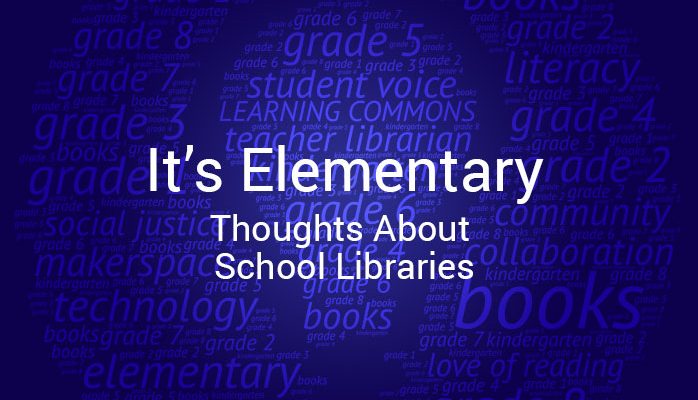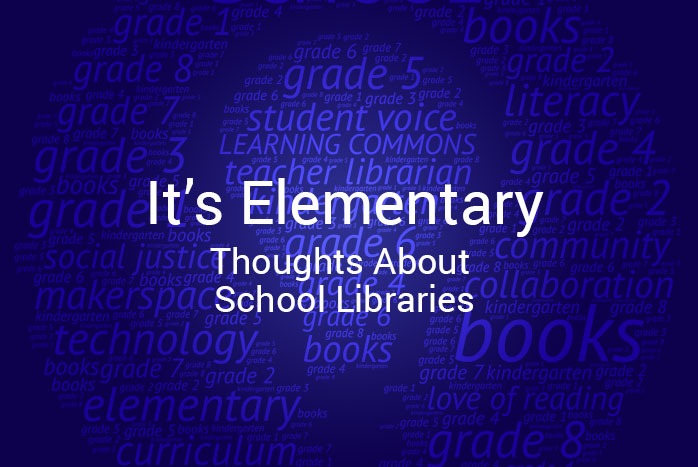I am intrigued with the work of fabulous secondary teacher librarian, Jonelle St. Aubyn. Her practice is both familiar and innovative.

Equity & Social Justice in the Library Learning Commons
I read an interesting tweet recently about transforming the perception of school libraries from a warehouse for books to houses of student learning. The phrasing of the tweet did not completely fit my approach but the overall sentiment certainly did. The idea that we, as teacher librarians, must actively work to transform both the function and perception of the space resonated with me immediately.
A long time mentor of mine often spoke about the importance of proving our worth and value to all stakeholders in our school communities. This idea stuck with me for years but I now see a deeper, more powerful potential in her message. Aware that some elementary school boards had eliminated teacher librarians, I always saw this as a version of self-preserving job security. Making our role invaluable and our practice transparent seemed enough.
But can we challenge ourselves to take that thinking even further?
I wonder if the real value of the library learning commons and those of us charged with its care, is the potential to empower learners to identify and deal with issues of equity and social justice.
A carefully, intentionally designed library learning commons is intended to be a completely safe, accessible environment for the entire school community. This does not mean we can be viewed as neutral. With each choice we make in our collection, our schedule, our decor, our language, our routines, we have the potential to take an equity stance. Whether we realize it or not, we are sending a message about what we value with even the tiniest decision. If our mandate is to include all members of our community in a school-wide hub of learning, then we must foster inclusion and equity to be successful. As we evolve and grow we can offer learning experiences and spaces for open dialogue, debate, questioning, inquiry and discovery in any area of interest. Putting aside for a moment the logistical challenges of scheduling, if our doors are always metaphorically open to opposing views, new ideas and creative initiatives, then it only makes sense that addressing issues of equity and social justice is already embedded in our practice.
Here is the truth though – all of that sounds lofty and lovely but let’s be honest, it also sounds a bit overwhelming!
I encourage all of us to resist the urge to let that feeling side track our equity journey. The library learning commons is the ideal space for students who feel silenced, disenfranchised or outside the perceived norm to find solace. It can also be the perfect setting for students to discover and question confusing inequities or injustices facing our society. We can encourage and foster critical thinking and inquiry in a safe, thoughtful manner. Supporting our students to develop deeper understandings of the world, themselves and their own power to become agents of change is an amazing opportunity.
Author Libba Bray is credited with the following quote about libraries:
“The library card is a passport to wonders and miracles, glimpses into other lives, religions, experiences, the hopes and dreams and strivings of ALL human beings, and it is this passport that opens our eyes and hearts to the world beyond our front doors, that is one of our best hopes against tyranny, xenophobia, hopelessness, despair, anarchy, and ignorance.”
Although her reference was not directed at school libraries themselves, for me it certainly applies. Occasionally I feel overwhelmed creating a library learning commons that acts as a safe space for these important discussions around power, oppression, bias, injustice and social awareness. In those moments I find I often return to the vision set forth in OSLA’s Together for Learning: School Libraries and the Emergence of the Learning Commons.
I also ask myself reflective questions and revisit resources that help me to consider each of my choices through the lens of equity and social justice. Obviously each educator must partake in their own equity journey and develop their own list of questions and resources to support their work, but hopefully the ideas below may help along the way.
Click here for: Reflective Questions and Equity Resources
Jennifer Brown is the Teacher Librarian at the Castle Oaks Public School in the Peel District School Board. It’s Elementary: Thoughts About School Libraries is a regular column on Open Shelf. Jenn can be reached at jennifer.m.brown [at] peelsb.com and by following her Twitter account @JennMacBrown.
This Post Has One Comment
Comments are closed.

[…] Brown, J. (2017). Equity & social justice in the library learning commons [Blog post]. Retrieved from http://www.open-shelf.ca/170201-equity-social-justice/ […]